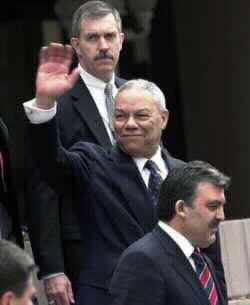Powell Seeks Restraints on Turkish Forces
02/04/2003| IslamWeb
 The United States and Turkey agreed Wednesday on an "early warning" system to avert friction between Turkey and Iraqi Kurds. The agreement, worked out by Secretary of State Colin Powell and a Turkish leader, was designed to reduce any likelihood of Turkey moving military forces into northern Iraq . At a joint news conference, Foreign Minister Abdullah Gul of Turkey said "new doors will open for us" in cooperating with the United States.
The United States and Turkey agreed Wednesday on an "early warning" system to avert friction between Turkey and Iraqi Kurds. The agreement, worked out by Secretary of State Colin Powell and a Turkish leader, was designed to reduce any likelihood of Turkey moving military forces into northern Iraq . At a joint news conference, Foreign Minister Abdullah Gul of Turkey said "new doors will open for us" in cooperating with the United States.
Powell said Turkey also had agreed to facilitate delivery of humanitarian assistance to Iraqi civilians and fuel supplies to coalition forces. He said enhanced military cooperation, such as evacuating wounded troops through Turkey or allowing coalition planes in distress to land in Turkey, was under consideration.
Powell said he hoped the new joint arrangement would be concluded within a week and that Iraqi Kurds would cooperate.
"We have the situation under control," he said. "There is no need for movement of troops across the border."
Turkey, with a large Kurdish population, is worried that Iraqi Kurds might declare independence and embolden separatists in Turkey, who have fought for autonomy in the southeast for 15 years.
Powell said the early warning system would provide for immediate consultation between Turkish and U.S. officials in the event of tension. At the end of the 1990-91 Gulf War , there was a surge of Kurdish refugees from Iraq into Turkey.
Turkey's refusal to permit use of its territory for U.S forces to invade Iraq strained U.S. relations with Ankara and caused the Bush administration to shelve a proposed 6 billion dlrs aid package.
Powell said Wednesday outside the Turkish foreign ministry that the U.S. military "worked around" Turkey's refusal to permit use of its territory. More than 1,000 U.S. invasion troops parachuted into northern Iraq last week, accompanied by tanks and Bradley fighting vehicles.
Gul, for his part, said "Turkey is within the coalition" and that overflights of Turkish territory by coalition combat aircraft would continue.
"The visit of Secretary Powell has strengthened our relations and helped to dispel all issues with regard to relations between the two countries," he said.
Powell, in similar warm terms, said U.S.-Turkey ties were strong and have endured for 50 years. "Turkey is an important member of the coalition against Saddam Hussein ," he said.
Powell met with Gul, Prime Minister Recep Tayyip Erdogan and other Turkish officials over a six-hour period Wednesday.
About two dozen students protested Powell's visit outside the Foreign Ministry, chanting "Murderer, murderer, get out of Turkey!" About five minutes before Powell arrived for the round of meetings, police detained all of the protesters.
After his talks in Turkey, Powell planned to fly to Belgrade for a courtesy call on President Svetozar Marovic and Prime Minister Zoran Zivkovic of Serbia and Montenegro "to show our support for the country as they go through this difficult time and let them know we are with them."
Prime Minister Zoran Djindjic was assassinated last month in what was considered a severe blow to evolution to democracy in what remains of the former Yugoslavia.
From Belgrade, Powell was going to Brussels, Belgium, for consultations with European Union officials who planned to tell him at a Thursday meeting that the United Nations must play the central role in rebuilding postwar Iraq.
Powell also was meeting in Brussels with his Russian counterpart, Igor Ivanov.
EU spokeswoman Emma Udwin said Tuesday, "We believe the U.N. system has a unique capacity and experience in post-conflict states. The U.N. should play a central role during and after the crisis."
Congress, meanwhile, is looking hard at President Bush's request for 1 billion dlrs in special assistance for Turkey. Powell said this is designed to deal with longtime economic woes.
Turkey passed up a 6 billion dlrs aid package by declining to permit U.S. invasion troops to use Turkish territory to launch an invasion of northern Iraq.
Powell said the Pentagon was considering ways in which Turkey could assist in the war with Iraq beyond the use it has provided of its airspace for coalition combat aircraft.
Against that backdrop, the United States has started pulling some 50 warplanes out of Incirlik air base in southern Turkey after it became clear that Turkey would not allow them to be used in an Iraq war. The planes had patrolled northern Iraq since after the 1991 Gulf War.
Powell said he would like Turkey to assist in providing humanitarian aid to Iraqis.
On the war itself, Powell remained optimistic.
"There is no doubt in my mind that we will prevail," he said. "But I cannot tell you how long that will take." The former Army general who was chairman of the U.S. Joint Chiefs of Staff in the 1991 Gulf War said there were "rhythms and patterns" in all wars that were not easily apparent.
PHOTO CAPTION
U.S. Secretary of State Colin Powell waves to journalists as he leaves the Turkish prime minister's office with his Turkish counterpart Abdullah Gul, right, in Ankara, Wednesday April 2 2003, after he met with Turkish Prime Minister Recep Tayyip Erdogan. (AP Photo/Burhan Ozbilici)
www.islamweb.net
